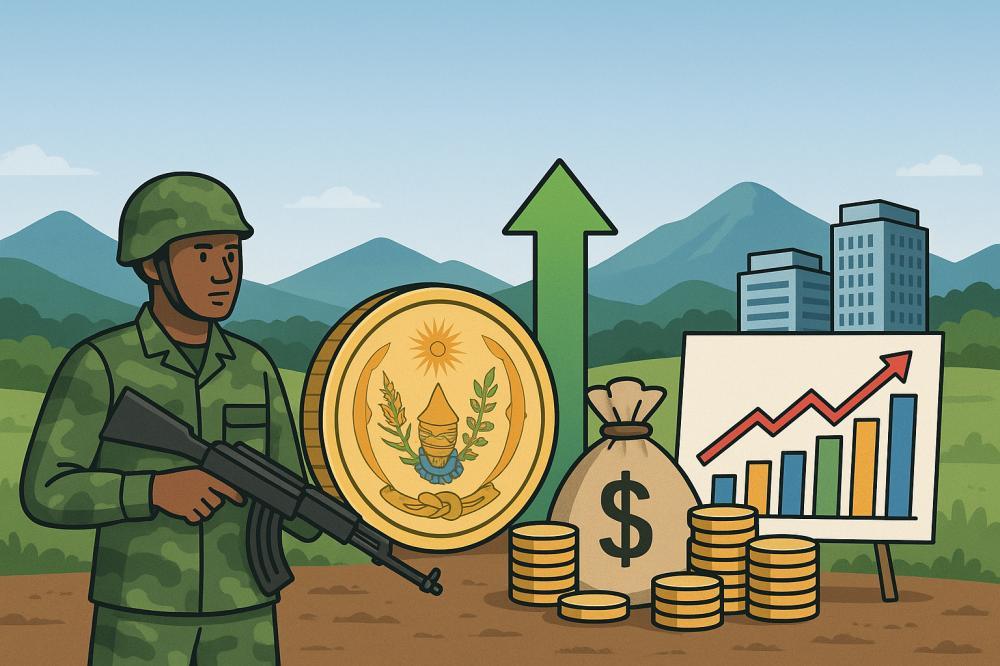Donnah Rubagumya
Africa-Press – Rwanda. For nearly three decades, Rwanda’s doctrine of national defense has been anchored in discipline, preparedness, and a capable military force that has protected our sovereignty. But today’s threats are more complex, more transnational — and increasingly economic. It’s time to widen our definition of defense.
The modern battlefield is no longer just marked by borders and boots. It is shaped by banks, balance sheets, and infrastructure corridors. Rwanda’s next line of defense must be economic influence.
This is not a theoretical ambition. It is a strategy already taking shape and one that now requires deliberate institutionalization. Rwanda should position itself as Africa’s most trusted hub for project financing — not only to build our own nation, but to help finance and shape our neighbours’ futures. In doing so, we protect our own.
Here’s the logic: when Rwanda becomes the bridge through which Africa finances its roads, ports, energy plants, and food systems, we cease to be seen as a small, landlocked country. We become an indispensable player in the continent’s survival.
No country antagonizes the nation financing its future. No regional actor threatens the capital flowing into its infrastructure. Economic influence becomes our soft armor — deterrence through value.
But to wield this influence effectively, Kigali must shift from traditional development finance approaches. The old reliance on Bretton Woods institutions like the IMF and World Bank is no longer sufficient.
These models are cautious, slow-moving, and bound by rigid conditionalities. Africa’s infrastructure gap is too vast, too urgent, to be closed by grants and concessional loans alone. Rwanda must embrace bold, alternative models for raising capital.
There are precedents. The Gulf States and Asian Tigers did not wait for Western validation to transform themselves. Qatar, Saudi Arabia, and the UAE used sovereign funds, Islamic finance, alternative collateral structures, and bilateral investment deals to leapfrog bureaucratic hurdles.
Singapore, Malaysia, and South Korea deployed state-backed banks, export credit agencies, and blended capital strategies long before these became common tools.
Africa must learn from these examples and reject Engineering, Procurement, Construction & Finance (EPC&F) deals that often become traps disguised as solutions. These contracts typically favor foreign contractors who inflate costs, bring in their own labor, and lock governments into opaque, high-interest repayment schemes.
These are not partnerships — they are extraction under the guise of infrastructure.
Instead of falling into such traps, African nations should turn to Kigali for the design and syndication of infrastructure projects that are bankable, inclusive, and future-proof.
Rwanda already has one essential foundation: credibility. Our governance is respected; our institutions deliver. What we now require is the financial engineering expertise to convert this trust into structured deals that attract global capital.
The Kigali International Financial Centre (KIFC) must evolve into Africa’s premier platform for project syndication — a place where governments come not just for advice but for real solutions. Kigali must become the city where Africa’s transformation is banked.
Let’s be clear: this is not charity. This is a national security strategy. When Rwanda brokers an $800 million solar grid for Malawi or a $1.5 billion logistics corridor in Zimbabwe, we are not merely exporting technical expertise — we are buying strategic leverage. We are investing in regional stability. We are making it economically irrational for others to undermine us. This is defense by design.
The security dividend is immediate and clear. First, economic interdependence fosters quiet deterrence. Second, Rwanda’s private sector benefits. Our firms can earn equity in the very projects we help finance.
To formalize this strategy, Rwanda should take three deliberate steps to anchor its position as Africa’s trusted financing partner:
Forge Alliances with Global Financiers: Build formal partnerships with strategic financiers, positioning Kigali as their most reliable African counterpart.
Establish a Pan-African Project Finance and Security Desk: Create a dedicated cross-sectoral unit tasked with identifying high-impact projects, structuring deals with strategic and security implications in mind, and securing tangible returns for Rwanda.
This desk should work closely with firms experienced in alternative financing tools — such as SBLCs and Safe Keeping Receipts (SKRs) — and with credible institutions like HSBC and MAEC Finance.
Test Innovative Models at Home: By successfully piloting these mechanisms domestically, Rwanda strengthens its credibility and sets a replicable example for the continent.
Rwanda’s geopolitical future will not be defined by military strength alone. It will be secured by how indispensable we become to Africa’s development. The RDF will always defend our sovereignty, but our long-term security will hinge on the strength of our economic influence.
Kigali must also position itself as Africa’s capital for innovation and investment. Rwanda should be where bold ideas find backing, and where Africa’s entrepreneurs come not merely to pitch, but to build. The message across the continent must be clear: If you’re brilliant, come to Kigali — for seed capital, for scale-up funding, for partnerships that grow with purpose.
By becoming the launchpad for Africa’s next generation of builders and creators, Rwanda cements its role as the continent’s financial nerve center.
Let Kigali be the place where Africa’s future is financed. Let Rwanda defend itself by becoming too useful to threaten, too trusted to isolate, too strategic to ignore.
Source: The New Times
For More News And Analysis About Rwanda Follow Africa-Press






